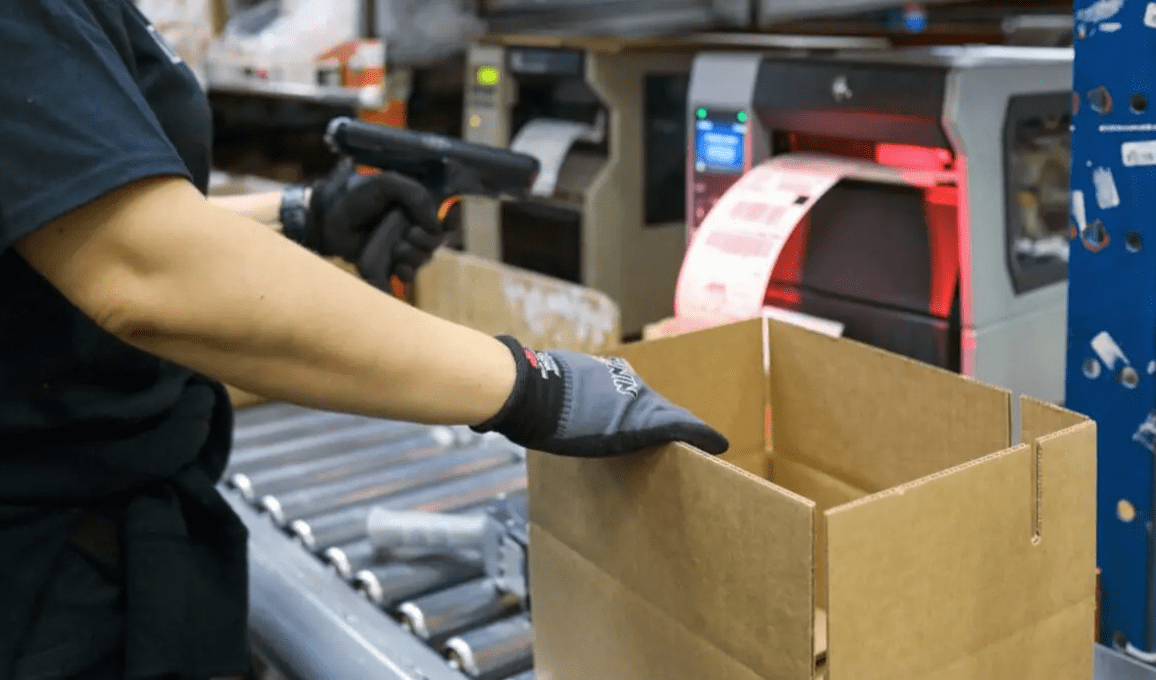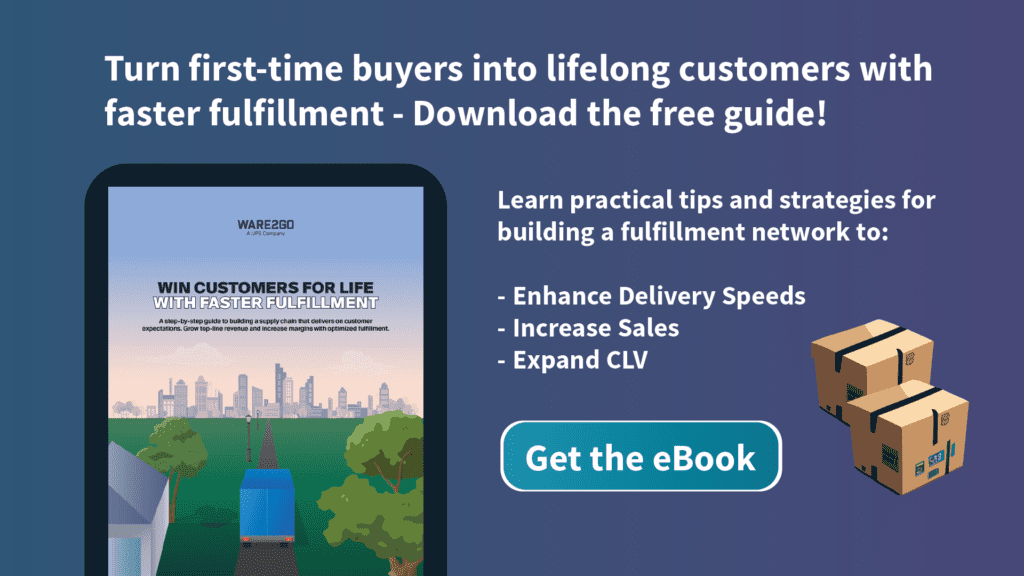Seventy-one percent of 3PL customers found that using a 3PL helped improve their customer service. For all brands, third-party
fulfillment services offer a solution to the complexities of eCommerce logistics.
Fast-growing brands can struggle to meet market demands and avoid stockouts, making reliable shipping challenging. Partnering with a third-party fulfillment company can address these issues, freeing up your resources and time to dedicate to other parts of the business.
A third-party fulfillment service manages the storage, packing, and shipping of goods on behalf of another business.
In this blog, we’ll cover what a third-party fulfillment center is, what third-party logistics are, the benefits of using third-party fulfillment services, and more.
What Is a Third-Party Fulfillment Center?
First off, a fulfillment center is more than just a warehouse. It’s a full-service fulfillment provider that processes incoming orders, picks and packs products, and then ships them directly to your end customer. Your fulfillment center may be inside your living room, you may own and operate your fulfillment network, or you may choose to outsource order fulfillment to a third-party fulfillment company.
The right third-party fulfillment company should use a partnership approach that eases your operational burden of delivering products so you can focus on the parts of your business that you know best.
What Is a Third-Party Distribution Center?
A third-party distribution center is a facility operated by an external company to manage the storage, handling, and distribution of products for businesses. While this sounds like a third-party fulfillment center, there’s a difference between the two.
A third-party distribution center often deals with bulk shipments and larger-scale distribution orders instead of individual customer orders.
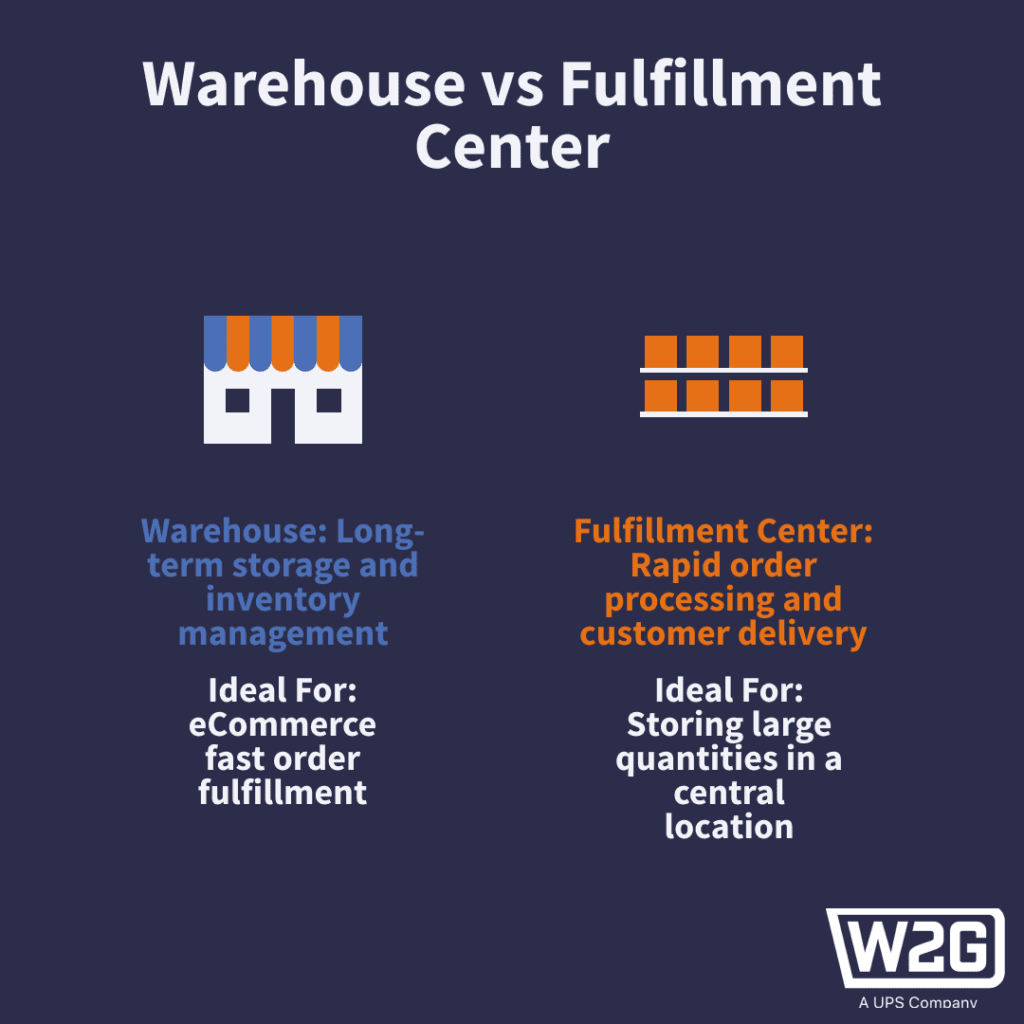
What Is the Difference between a Fulfillment Center and a Warehouse?
A fulfillment center and a warehouse serve different purposes in the supply chain.
Warehouses:
A warehouse primarily stores goods for extended periods, focusing on inventory management and bulk storage. It’s designed for long-term storage and typically handles large shipments.
Warehouses are ideal for businesses storing large quantities of inventory in a centralized location. They provide the necessary space and logistics to manage stock levels, organize products, and prepare for future distribution.
Fulfillment Centers:
In contrast, a fulfillment center processes and ships orders quickly and efficiently. It handles tasks like picking, packing, and shipping products directly to customers. Fulfillment centers ensure fast turnaround times, often catering to eCommerce businesses that require delivery speed or even same-day fulfillment to meet customer expectations. These centers manage the entire fulfillment method, integrating inventory management, order processing, and logistics to provide a seamless customer experience.
The Benefits of Using Third-Party Fulfillment Services
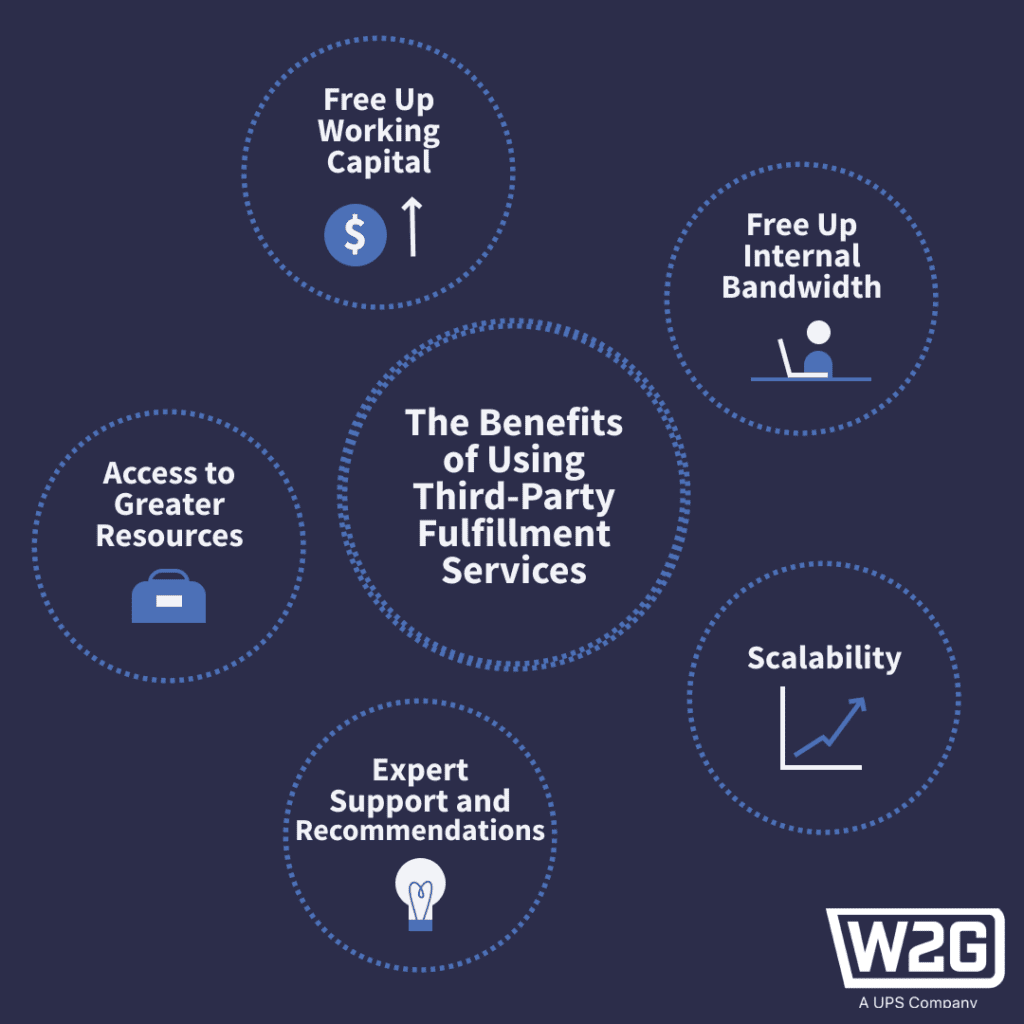
If you’re successfully managing your fulfillment in-house, you may wonder why you would outsource to a third-party provider. However, even the most sophisticated companies choose to partner with a third-party fulfillment company for any of the following reasons:
- Free Up Working Capital – For young and high-growth businesses, it’s important to have capital on hand to invest in new product lines or increase headcount. Owning and operating your fulfillment centers is a capital-intensive endeavor, but outsourcing to a third party can free up some of that capital to invest in your business.
- Free Up Internal Bandwidth – Similarly, you may find that fulfillment demands a high percentage of your employees’ time and energy. Outsourcing can free up some of their bandwidth to focus on essential tasks that will drive better results for your business.
- Scalability – An excellent third-party fulfillment partner will meet your current business needs and have the capacity to scale up quickly when you experience periods of rapid growth. Scalability also allows you to increase seasonal demand capacity and scale back in the off-season.
- Expert Support and Recommendations – Having a dedicated fulfillment partner gives business owners access to experts across the supply chain who can make recommendations on inventory distribution, inventory management, and demand forecasting.
- Access to Greater Resources – A third-party fulfillment center will likely have access to greater resources, including fulfillment technology, inventory management, and a diverse network of facilities that can meet different storage needs.
Using a third-party fulfillment service makes it easier to scale your business in an efficient and manageable way.
Customer Story: ECR4Kids Partners with Ware2Go for Outsourced eCommerce Fulfillment
Children’s furniture brand ECR4Kids successfully operated multiple fulfillment centers in-house to fulfill their largely B2B orders. However, when they moved into direct-to-consumer (D2C) sales, they quickly realized that their facilities weren’t set up to meet consumer expectations for delivery.
They outsourced their D2C order volume to Ware2Go for a short trial period. When they saw how much more efficient their business was with a third-party fulfillment provider, they chose to exit their in-house facilities and outsource all of their fulfillment to Ware2Go.

What Services Do Third-Party Fulfillment Centers Provide?
As previously mentioned, a fulfillment center is much more than a warehouse. A full-service third-party fulfillment center should offer the following services:
- Inbounding – Receiving and processing inbound shipments should happen quickly so your products are stocked and ready to be sold immediately.
- Storage – Proper storage protocols reduce damage and shrinkage during long-term or short-term storage to ensure inventory remains accessible.
- Inventory Management – A quality fulfillment center will perform regular inventory cycle counts to reduce shrinkage, provide data to inform inventory reorder points, and make recommendations on where to store inventory within their network.
- Distribution Services – Managing storage, handling, and distribution of business products. This holistic approach ensures that products are processed efficiently, stored correctly, and dispatched quickly according to customer demands.
- Inventory Analytics – By using data to track stock, predict the required quantity, and efficiently manage inventory, companies can avoid having excessive or inadequate stock, improving the smoothness and profitability of operations.
- Custom Packaging – Creating branded or specialized packaging to enhance the customer experience and ensure products arrive safely, boosting brand recognition and customer satisfaction.
- Picking and Packing – Protocols like proper warehouse slotting help make picking and packing more efficient, reducing mis-picks and improving on-time fulfillment and delivery.
- Outbound Shipping – A third-party fulfillment center will have regular pickups directly from their facility. Choose a partner that has a strong relationship with reliable carriers.
Partnering with a full-service third-party fulfillment center offers businesses holistic solutions from strategic inventory management to customer-centric services like custom packaging.
How to Choose a Third-Party Fulfillment Company
It’s important to choose the right third-party fulfillment company for your business. Here are some key factors to consider:
1. Experience and Reputation
Look for a fulfillment partner with a solid track record and positive reviews. An experienced company is more likely to handle your needs effectively and manage challenges efficiently.
Checking case studies provides insight into their capabilities and past successes. For example, The Cushion Lab used Ware2Go’s scalable fulfillment process to achieve a 9x growth in sales volume year over year.
Another example is the health and fitness brand O2, which grew its eCommerce sales by 10x and its overall business by 5x by partnering with Ware2Go. Ware2Go’s flexible fulfillment options allowed O2 to manage orders across multiple sales channels efficiently, ensuring rapid replenishment and maintaining inventory levels even during high-demand periods.
2. Location and Distribution Network
The location of the fulfillment centers and the strength of their distribution networks are key. A company with strategically located centers or warehouses can reduce shipping costs and times, ensuring faster delivery for your customers. The optimal storage location will minimize storage costs and improve overall efficiency.
Assess the company’s infrastructure and resources to ensure they can handle your order volume, especially during peak seasons. Check if they have scalable solutions to manage fluctuations in demand without compromising on service quality.
3. Services Offered
Ensure the fulfillment company provides comprehensive services that meet your business needs. Key services include:
- Inventory Management – Effective tracking and management of stock levels.
- Warehouse Management – Ensures efficient operations, optimized inventory levels, and accurate order fulfillment.
- Shipping – Reliable shipping times and options.
- Returns Processing – Efficient handling of returns and exchanges.
- Customization – Custom packaging and labeling options to enhance your brand’s presentation.
4. Cost and Pricing
Analyze the pricing structure to ensure it aligns with your budget. Consider all costs, including storage fees, picking and packing fees, shipping rates, and any additional charges. A transparent pricing model will help you manage your finances better by avoiding unexpected storage costs.
5. Customer Support
Reliable customer support improves your overall reputation and business operations, so your customers won’t have to deal with lousy customer service. Excellent customer service contributes to customer retention and loyalty, so make sure the fulfillment company you choose provides the necessary support channels and a solid service.
By considering these factors, you can select a third-party fulfillment company that aligns with your business goals, enhances operational efficiency, and supports your growth.
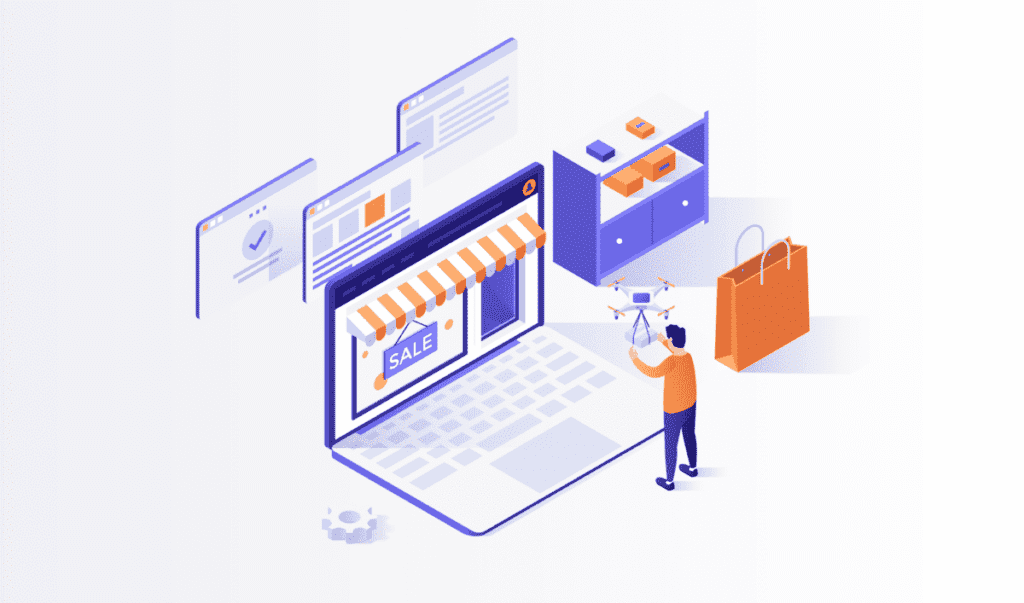
How Many Fulfillment Centers Do You Need?
Most merchants fulfill all of their orders from a single fulfillment center. However, as they grow, they find that their consumers are spread out all over the country. If they continue to fulfill from a single fulfillment center, they’ll ship a percentage of their orders nationwide. These long-zone shipments are costly and don’t meet consumer expectations for fast shipping.
Distributing inventory to multiple fulfillment centers across the country lowers the time in transit (TNT) to the end customer, lowering the cost of delivery and enabling faster shipping promises. Many merchants know they should be distributing their inventory, but knowing how many fulfillment centers they need and where to position them can be a barrier to entry.
Ware2Go’s free tool, NetworkVu, uses your sales and shipping data to recommend a custom fulfillment network for your business. It displays multiple scenarios so you can see how adding additional warehouses to your network will affect your TNT and your cost of fulfillment.
Following these recommendations can help you determine the optimal number and locations of fulfillment centers in your network, ensuring the fastest possible delivery times for your customers.
The Importance of Third-Party Fulfillment Services
Partnering with a third-party fulfillment center provides several benefits for online businesses, especially brands facing challenges in efficient supply chain management. By outsourcing fulfillment, businesses can rely on expert support, access better resources, and free up capital and internal bandwidth.
Third-party fulfillment services provide scalability and flexibility so businesses can effectively meet market and customer demands.
Use Ware2Go’s service to optimize your fulfillment network, guarantee fast delivery, and increase your customers’ satisfaction and retention.

